(Stacker) Black History Month is dedicated to celebrating the achievements and reflecting on the experiences of African Americans. What began as a week in 1926 has blossomed into 28 days of remembrance and lessons on the contributions of Black Americans.
Many Black Americans come from a lineage of captured and enslaved people who were forcibly brought to the U.S. to build the culture and infrastructure of a place in which they never asked to live. Forced immigration and centuries of cultural genocide have driven Black Americans to literally and figuratively rebuild a culture from the ground up. In the face of historical oppression and inequality—slavery, Jim Crow laws, and the police violence that ignited the #BlackLivesMatter movement—African Americans have continuously fought for their rights, reaching countless milestones, achievements, and freedoms in doing so. While being forced to exist largely on the fringes of society, Black Americans nevertheless have made many significant contributions to the arts, education, politics, technology, and numerous other fields.
The 1930s saw history from Olympic track and field star Jesse Owens and the eventual breakout moment of author-activist Zora Neale Hurston; in the ’50s, the first Civil Rights Act since 1875 was signed into law; and five decades later, in 2008, Americans elected the first Black president.
But in the theme of education—part of the function of this month for much of the country—you’ll learn of other, less-discussed moments and perhaps some unfamiliar faces in Black history: the desegregation of the armed forces in the ’40s, the first Black Miss America in the ’80s, and the 1995 Million Man March in Washington D.C., are a few remarkable moments.
Peruse Stacker’s list to learn more about some of the significant achievements and moments in Black history, from 1919 to 2021.
1919: Oscar Micheaux produces ‘The Homesteader’
Regarded as the first African American feature filmmaker, Oscar Micheaux produced the film version of his book “The Conquest” under the name “The Homesteader.” This silent film featured an all-Black cast and touched on the issues of race relations during that era.
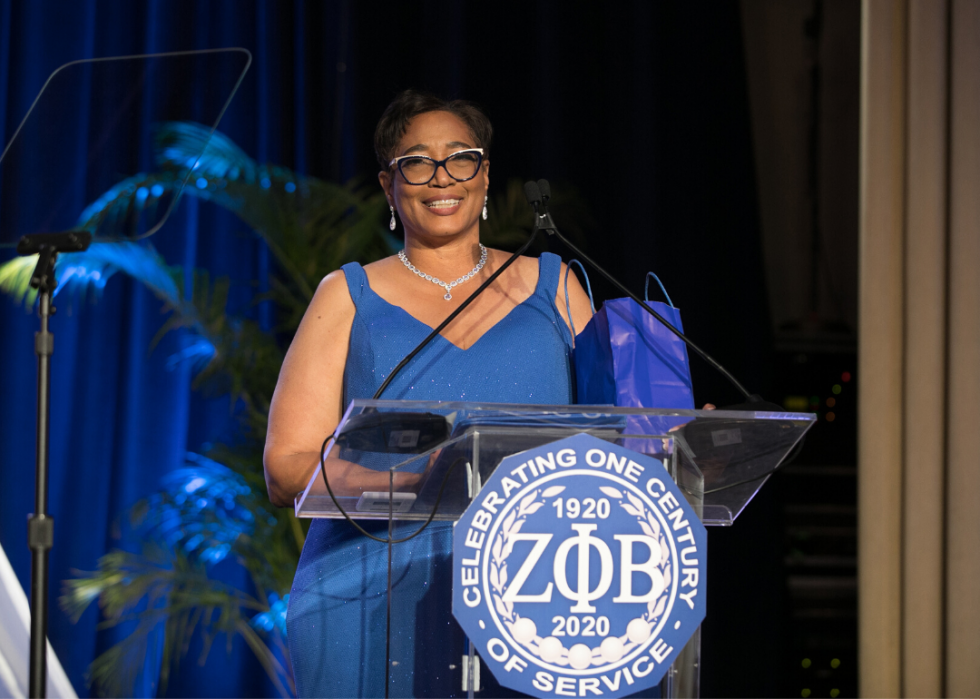
Brian Stukes // Getty Images
1920: Zeta Phi Beta is established at Howard University
This historical, Greek-lettered sorority was created by five women Howard University students. Their vision was to effect positive change and raise cultural awareness within their community while promoting high educational standards. The sorority is still around today and remains based out of its Washington D.C. headquarters the sorority purchased in 1959.
1921: ‘Shuffle Along’ becomes the first major African American musical on Broadway
When “Shuffle Along” debuted on May 23, 1921, almost a decade had passed since an all-Black musical of any kind had graced a Broadway stage. The vaudeville-style play about a mayoral race launched the careers of Josephine Baker and Paul Robeson and is widely regarded as one of the first Black musicals to cross over to mainstream white audiences. As such, the musical’s success signaled a change and dismantling of sorts of racial segregation in the Broadway theater world.
1922: Abolitionist Frederick Douglass’ home becomes a national museum
In 1922, Cedar Hill, Douglass’ home until his 1895 death, became a certified historical site. Among the preserved sites visitors can see during a visit is his “growlery,” or man cave. Douglass would retreat to this private room with a stove, desk, and a bed whenever he wanted privacy to work on his writing.
1923: Jean Toomer’s ‘Cane’ is published
This series of vignettes explore the African American experience in the United States. Alternating in structure between prose, poetry, and script-like writing, most passages in the book are freestanding, though some characters are reoccurring. “Cane” sold under 1,000 copies upon its release but went on to become an important relic of Harlem Renaissance literature.
1924: National Bar Association is founded
The National Bar Association was founded out of two movements—the Greenville Movement and the Convention of the Iowa Colored Bar Association—after a number of Black lawyers were denied membership to the American Bar Association. Today, the association has more than 84 chapters and represents more than 60,000 law professionals.
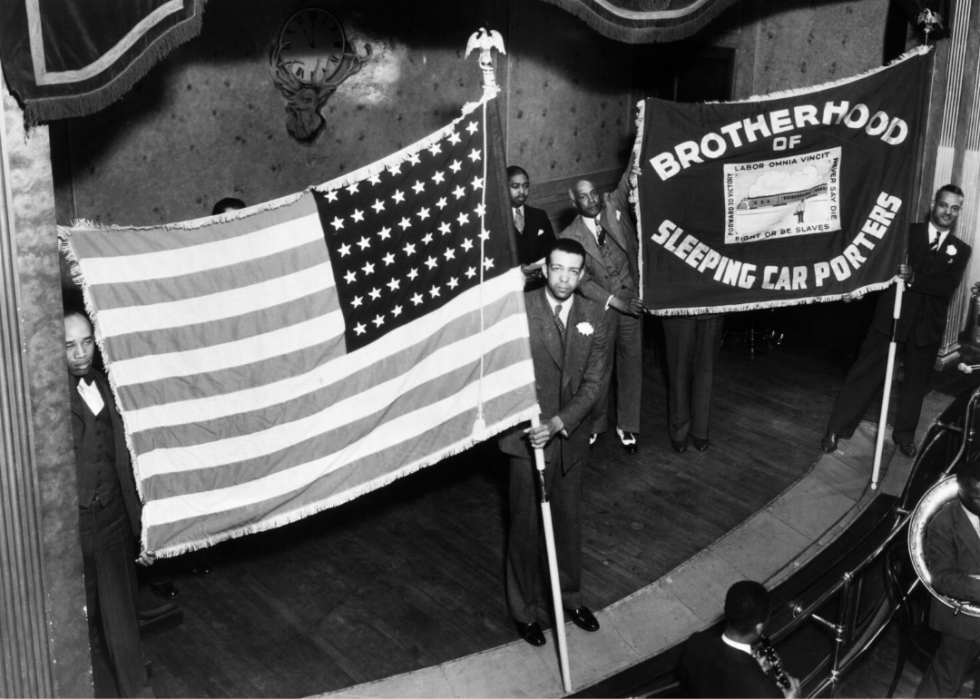
Bettmann // Getty Images
1925: A. Philip Randolph and Milton P. Webster create the BSCP
Organized by African American employees of the Pullman Company, the Brotherhood of Sleeping Car Porters (BSCP) was the first labor union by and for Black employees. A first of its kind, BSCP is largely considered significant in both the labor and civil rights movements.
[Pictured: Brotherhood of Sleeping Car Porters display their banner at a 1955 ceremony celebrating the organization’s 30th anniversary. Asa Philip Randolph (1889-1979), Union president, seen wearing black and white shoes, holds up Brotherhood flag.]
1926: Negro History Week is formed
The precursor to Black History Month was the brainchild of historian Carter G. Woodson in collaboration with the Association for the Study of African American Life and History. Corresponding with the birthdays of Frederick Douglass and Abraham Lincoln, the week was initially erected to give Black Americans a sense of pride in their own history and has since been expanded to a whole month.
1927: Floyd Joseph Calvin hosts first Black radio show
“Courier Hour” was the first radio talk show that highlighted African American issues for its Black audience. His work inspired countless podcasts today that exist with the same mission of highlighting Black voices and issues.
1928: First African American elected to Congress
Oscar Stanton De Priest began his career in politics in 1915 with a stint on the Chicago City Council. More than a decade later, he made history when he was tapped as the Republican candidate for a seat in the House of Representatives representing the state of Illinois.
1929: Negro Experimental Theatre is established
The Negro Experimental Theatre (aka the Harlem Experimental Theatre) was the project of librarian and playwright Regina M. Anderson. The early theater company produced one-act plays and was one of the early companies to influence and encourage the arts in Black communities.
1930: Howard University Gallery of Art is established
Artist James V. Herring organized Howard University’s student gallery, a first of its kind. Howard University Gallery of Art was the first gallery on a Black campus, and the only gallery controlled entirely by African Americans.
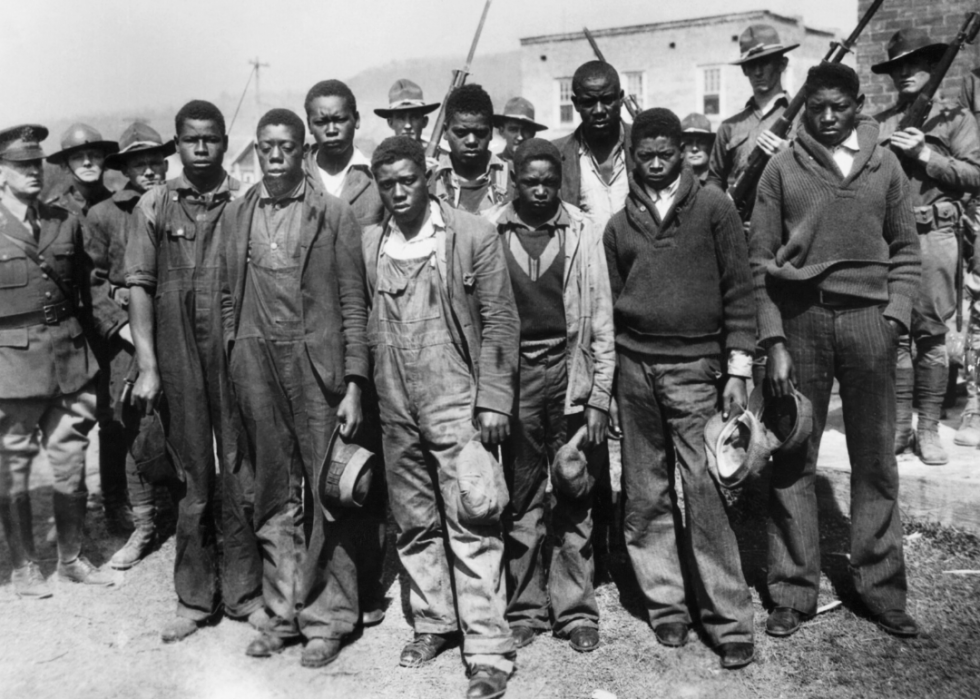
Bettmann // Getty Images
1931: Scottsboro boys are falsely convicted
In March 1931, nine African American teenagers were falsely accused of rape while aboard a train in Alabama. Eight of the nine were convicted and sentenced to death. The cases were eventually appealed in the United States Supreme Court, raising questions about unfair court proceedings for Black defendants, like being judged by an all-white jury. Over the course of subsequent retrials (and reconvictions), the boys in total served in excess of 100 years in prison. Ultimately, it was revealed the boys had been illegally hopping trains in search of work and, while detained for a minor charge, deputies convinced two white women to accuse the boys of rape. One of the women, Ruby Bates, recanted her story and became an advocate for freeing the Scottsboro boys.
[Pictured: The young Black men accused in the Scottsboro rape case under the protection of National Guard on March 20, 1931, in Scottsboro, Alabama.]
1932: ‘Tuskegee Study of Untreated Syphilis in the Negro Male’ begins
The U.S. Public Health Service, in conjunction with the Tuskegee Institute, began studying the natural occurrences of syphilis in the human body on unassuming and ill-informed Black male participants. The experiment involved more than 600 men, many of whom were not informed of their infection. They were also not given adequate or correct treatment for the disease. The study ended at the hands of a whistleblower in 1972; President Bill Clinton issued a formal apology in 1997.
1933: Dr. Carter G. Woodson’s ‘The Mis-Education of the Negro’ is published
“When you control a man’s thinking you do not have to worry about his actions,” says Dr. Carter G. Woodson in his groundbreaking book, “The Mis-Education of the Negro.” Woodson asserted that Blacks were essentially being mentally controlled by the public school system. In 1998, singer and rapper Lauryn Hill would make reference to the book with her debut album, “The Miseducation of Lauryn Hill.” In addition to launching Negro History Week and penning “The Mis-Education of the Negro,” Woodson was an accomplished author, journalist, American historian, and founder of the Association for the Study of African American Life and History.
1934: Maggie Lena Walker dies
Maggie Lena Walker grew up helping her mother, a former slave, with her laundry business. This early exposure to entrepreneurship made an impression; in 1903, Walker became the first African American woman to be president of a bank when she founded St. Luke Penny Savings Bank. In 1930, the bank became the Consolidated Bank and Trust Company, with Walker staying on as chairman. The bank continued on as a Black-owned institution following Walker’s death and was sold in 2005.
1935: National Council of Negro Women is created
The National Council of Negro Women, founded by Dr. Mary McLeod Bethune, continues to be influential in advocating on the behalf of African American women in the United States. Bethune was a champion of higher education: The school she founded, Bethune-Cookman University, became a four-year college in 1941.
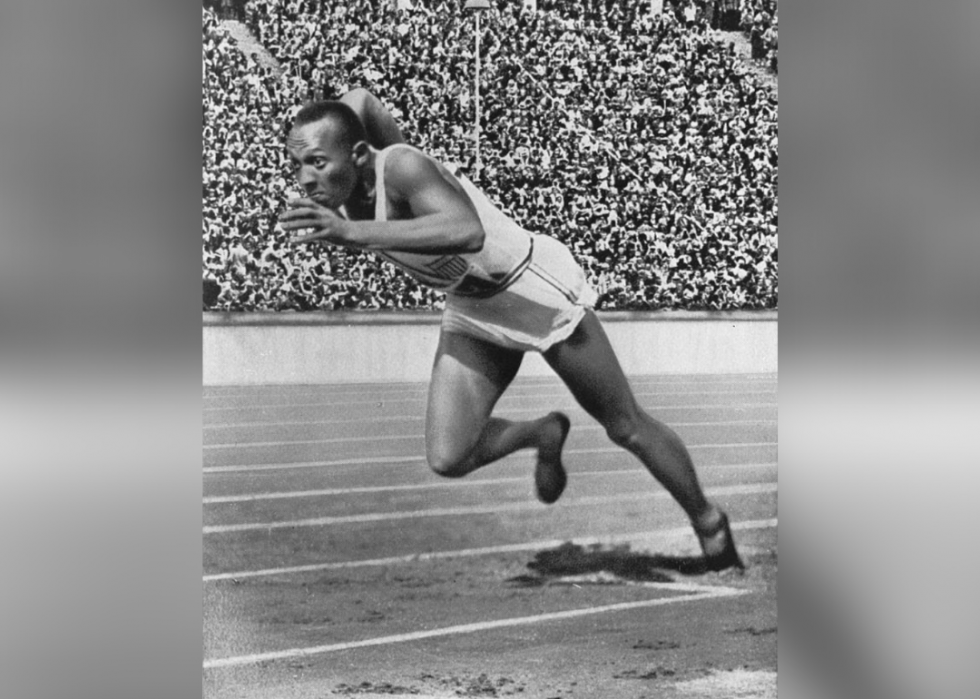
Library of Congress
1936: Jesse Owens wins four gold medals at the Berlin Games
At the 1936 Berlin Games, track and field star Jesse Owens broke and equaled nine Olympic records, setting three world records. In so doing, Owens additionally thwarted Adolf Hitler’s theory of white superiority.
1937: ‘Their Eyes Were Watching God’ is published
Zora Neale Hurston’s Black feminist classic, “Their Eyes Were Watching God,” tells the story of Janie Crawford and her personal changes over the course of her three marriages. Dismissed by many upon its release (and out of print for nearly 30 years), Hurston’s novel has become a crowning achievement about Black womanhood and the discovery of love.
1938: Artist Jacob Lawrence shows his first exhibition
Painter Jacob Lawrence’s brand of modernism depicted the various aspects of life in Harlem. His first solo exhibit was shown in February 1938 at the Harlem YMCA on 135th Street. A few years later, when he was just 24, Lawrence became one of the first Black artists to be presented by Downtown Gallery.
1939: Marian Anderson sings at Lincoln Memorial
Opera singer Marian Anderson was scheduled to sing at Washington’s Constitution Hall on Easter Sunday in 1939. But at the last minute, she was refused the opportunity because of her race by Daughters of the American Revolution (a move that caused First Lady Eleanor Roosevelt to leave the group). Instead, Anderson gave a free open-air concert on the steps of the Lincoln Memorial. The moment brought even greater awareness to the issues of racial injustice during that time period.
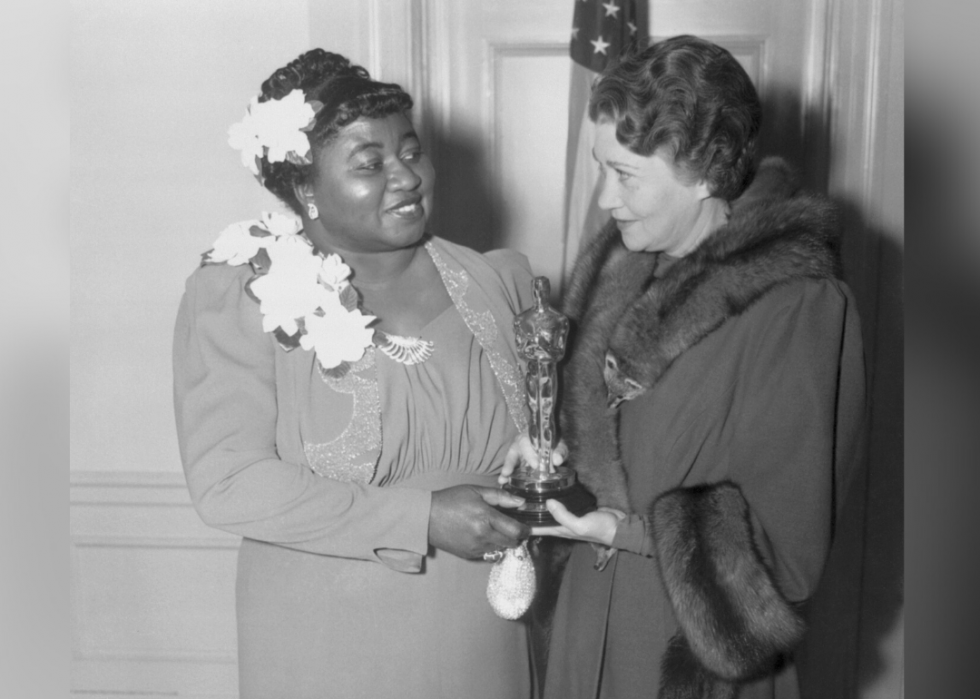
Bettmann // Getty Images
1940: Hattie McDaniel wins an Academy Award
Hattie McDaniel made history as the first African American person to win an Academy Award for her role as Mammy in “Gone With the Wind.” She came under fire at the time for her portrayal of a maid, but the defiant McDaniel famously retorted, saying she’d rather play a maid than serve as one in real life.
[Pictured: Actress Fay Bainter (at right) presents Hattie McDaniel with the Oscar for her supporting role in “Gone With the Wind” on Feb. 29, 1940, at the Twelfth Annual Banquet of the Academy of Motion Picture Arts and Sciences in Los Angeles.]
1941: National Negro Opera Company is created
The National Negro Opera Company was the first of its kind when musician Mary Cardwell Dawson founded it in 1941. The Black music association was created with the vision of affording Black Americans opportunities for cultural development through classical music.
1942: Hugh Mulzac becomes the first African American captain to command an integrated crew
Hugh Mulzac, a Black member of the U.S. Merchant Marine, was offered the chance at the onset of World War II to operate his own vessel. That ship was the SS Booker T. Washington, the first Liberty ship named after an African American. Mulzac said no at first, citing Commission policies stipulating he would be commanding an all-Black crew. What followed were protests from Black organizations such as the National Association for the Advancement of Colored People (NAACP), which pressured officials to change course. Mulzac then became the first African American ship commander, doing so over an integrated crew. The milestone did little to change things long-term, however, as he found himself out of a job by the early 1950s.
1943: Detroit Race Riots
The great migration from South to North brought mass amounts of Blacks to Detroit in search of work and a better life. Despite the city having 200,000 African American residents, Black people were still treated as second-class citizens—especially where housing was concerned. When Detroit started constructing Black housing projects and factories began promoting Black workers, disgruntled whites decided to fight back against the changing of the times. What followed were racially motivated attacks involving more than 200 Blacks and whites, leaving 25 African Americans dead and hundreds more injured.
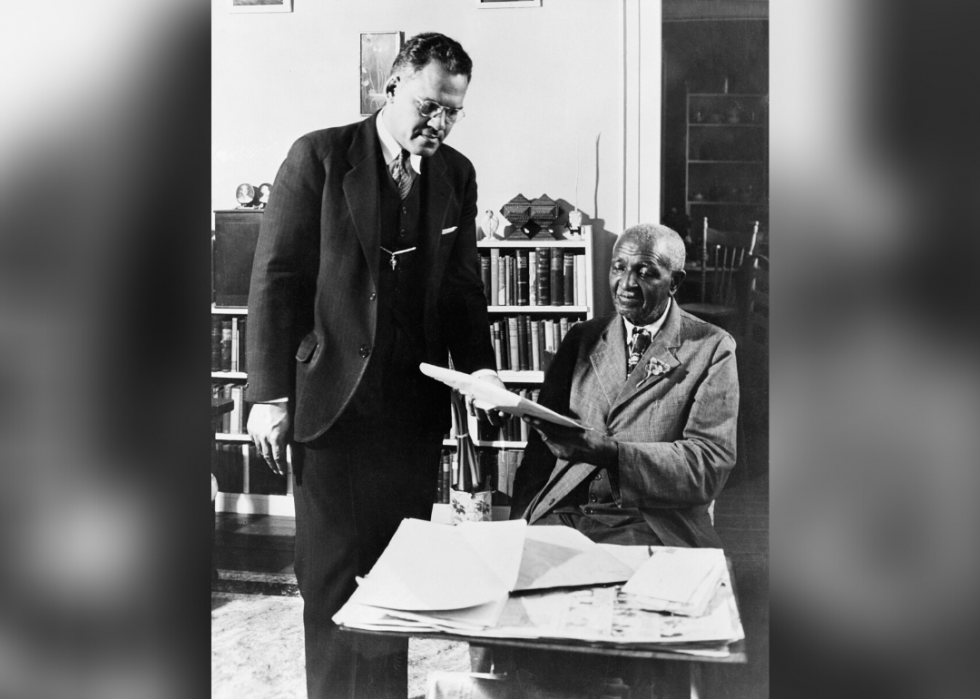
Bettmann // Getty Images
1944: United Negro College Fund is created
Dr. Frederick D. Patterson, president of the Tuskegee Institute, put out a call to other leaders of historically Black colleges urging them to pool sums of money together in a fund for inbound Black college students in financial need. In the last 70 years, the fund has supported more than 400,000 students in earning college degrees.
[Pictured: Tuskegee Institute president Dr. Frederick D. Patterson and George Washington Carver on April 2, 1940.]
1945: Ebony magazine debuts
John H. Johnson published the first issue of Ebony magazine in November 1945, heralding a new era of putting forth a positive image of Black Americans in mainstream media. A smaller news magazine called Jet was founded a few years later in 1951.
1946: Morgan v. Virginia invalidates separate but equal on interstate bus transport
In a case predating the Rosa Parks bus boycott, Irene Morgan was riding on a Greyhound bus and refused to give her seat up to a white passenger. Morgan was arrested but refused to plead guilty to violating Virginia’s segregation law. That move presented an opportunity for Morgan’s lawyer to argue that the law unfairly got in the way of interstate commerce. The case went all the way to the U.S. Supreme Court, which ruled in her favor.
1947: 16 men embark on the ’Journey of Reconciliation’
Sometimes called “the first freedom ride,” 16 Black and white men embarked on a direct-action bus trip that flipped racial structures on their heads: Black protesters sat at the front of the bus, while white protestors sat at the back. Protests like these served as a tangible representation of the power of hands-on activism.
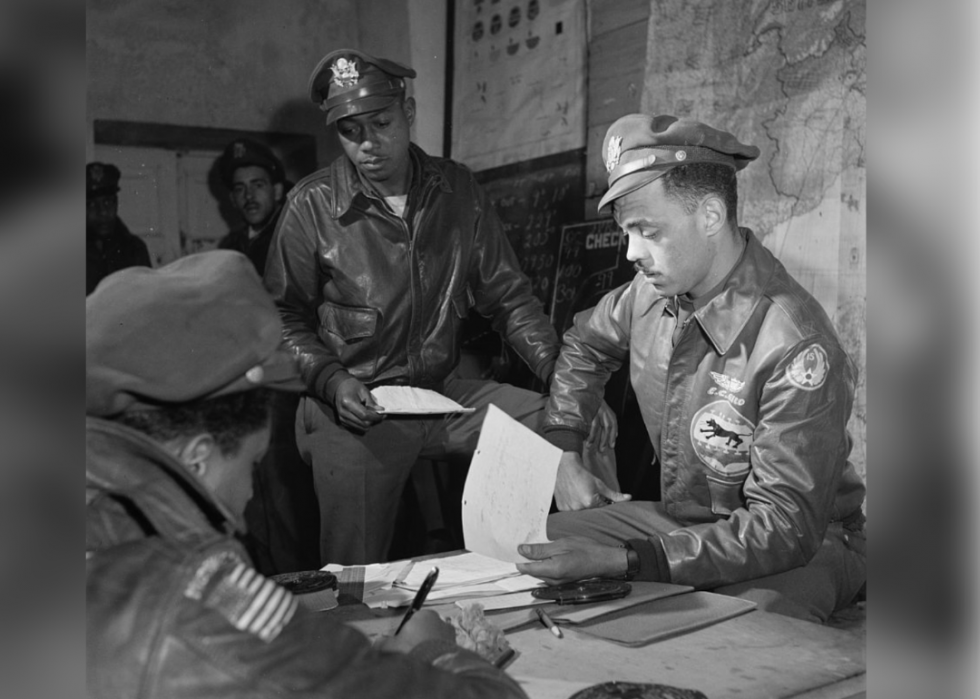
Toni Frissell/Library of Congress // Wikimedia Commons
1948: Desegregation of the US Armed Forces
In a step to dissolve segregated racial lines, President Harry Truman signed an executive order to integrate the U.S. Armed Forces, which effectively ended segregation across the military. There was significant pushback to the order; but by the end of the Korean War, most of the military was integrated.
[Pictured: Tuskegee airmen Woodrow W. Crockett and Edward C. Gleed in Ramitelli, Italy, in March 1945.]
1949: First Black-owned radio station
An accountant and professor by trade, Jesse B. Blayton Sr. made history when he founded WERD-AM in Atlanta, becoming the first Black man to own his own radio station. Blayton pioneered what he referred to as “Negro appeal” music, playing early R&B and soul cuts that didn’t get much airtime elsewhere. The radio station later became a supporter of the civil rights movement.
1950: Gregory Swanson is admitted to the University of Virginia Law School
With the help of a lawsuit, Gregory Swanson became the first Black student to attend the University of Virginia Law School. This historic victory allowed Black applicants to be permitted into the other University of Virginia professional programs as well.
1951: ‘We Charge Genocide’ petition is presented to the United Nations
Created by William Patterson and the Civil Rights Congress, the “We Charge Genocide” petition suggested the United States committed genocide against African Americans based on the outlines put forth by the U.N. Genocide Convention. More than 150 hate crimes that took place over the previous six years against Black people were documented, along with nearly 350 other violent crimes against Black Americans. The document, signed by 94 individuals and prominent civil rights leaders, was presented at the United Nations Convention in Paris.
1952: Cora Brown becomes Michigan’s first Black woman elected to state senator
Cora Brown’s successful 1952 campaign made her the first Black woman in the U.S. elected to a state Senate seat. She served as Michigan state senator through 1956, advocating on health issues, public utilities, and welfare. She became the special associate general counsel of the U.S. Post Office in 1957.
1953: Ralph Ellison wins the National Book Award for ‘Invisible Man’
The narrator of Ralph Ellison’s timeless classic is an unnamed Black man who reflects on all the ways he is not seen by society at large. “Invisible Man” delves into many of the everyday issues facing Black men in the first half of the 20th century, from identity politics and Black nationalism to race policies and ideas about individuality. It has been reported that Hulu has plans to turn the novel into a scripted series, in large part because of the continued relevance of the work.
1954: Davis et al. v. the St. Louis Housing Authority ends racial discrimination in St. Louis Housing Authority
Frankie Muse Freeman served as lead attorney in the landmark Davis et al. v. the St. Louis Housing Authority case that effectively put a stop to segregation in St. Louis public housing. Years later, Freeman led a task force to end segregation in St. Louis public schools.
[Pictured: Frankie Muse Freeman being sworn in as the first woman member of the U.S. Commission on Civil Rights in 1964. She was the lead attorney in Davis et al. v. the St. Louis Housing Authority.]
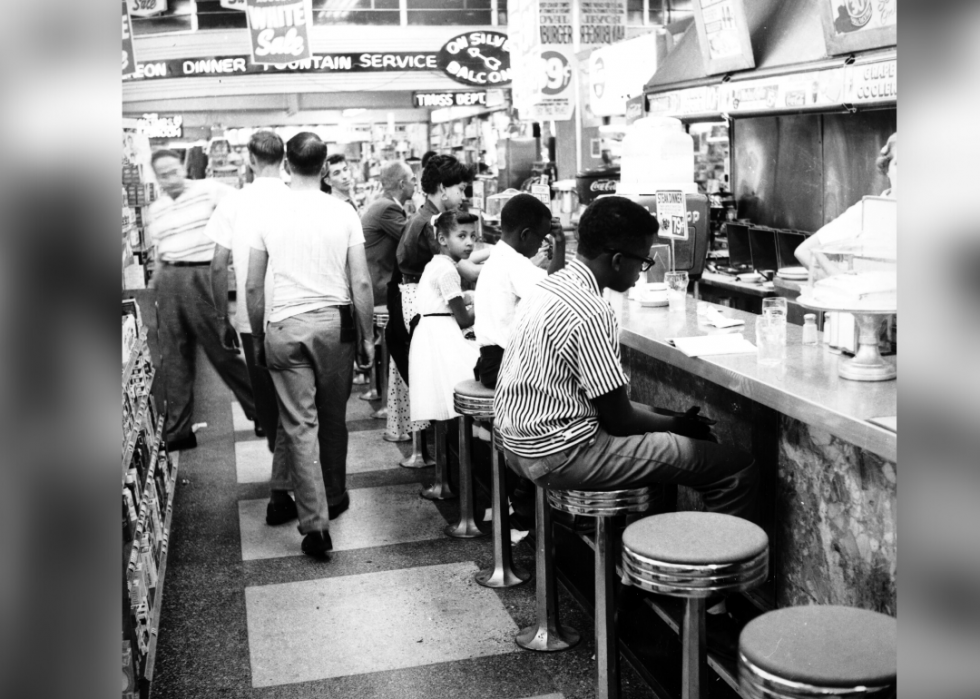
Johnny Melton/Oklahoma Historical Society // Getty Images
1955: Read’s Drug Store sit-ins begin
Local African American students of Morgan State College teamed up with the Committee on Racial Equality to stage a series of sit-in protests to desegregate the local lunch counter at Read’s Drug Store in Baltimore, Maryland. The peaceful, five-day protest was a success—after losing significant business, the drug store vowed to serve all customers.
[Pictured: A Civil Rights sit-in led by Clara Luper to desegregate the lunch counter at Katz Drug Store at Main and Robinson in downtown Oklahoma City, Oklahoma, Aug. 26, 1958.]
1956: ‘The Nat King Cole Show’ challenges racial lines on TV
Jazz legend Nat King Cole was the first Black man to host a nationally televised show with “The Nat King Cole Show” in 1956. For a little more than a year, Cole serenaded viewers and featured top entertainers. The show ended after 13 months because advertisers were hard to come by. Cole’s programming, however, paved the way for successful nighttime series like “The Arsenio Hall Show.”
1957: Civil Rights Act of 1957
President Dwight D. Eisenhower signed into law the Civil Rights Act of 1957 to protect civil rights, specifically Black voting rights. The act also established the Civil Rights Division in the Justice Department, giving federal officers the green light to prosecute those who deny or impede voter rights.
1958: Willie O’Ree is the first Black player in the National Hockey League
Willie O’Ree, the first Black player in the National Hockey League, is sometimes referred to as the “Jackie Robinson of Hockey.” O’Ree was influential in opening doors of professional hockey to Black players, including Dustin Byfuglien who led his team to a Stanley Cup championship in 2010.
1959: Motown Records is founded
With the opening of his Detroit-based label, Berry Gordy began churning out soul hits that left lasting imprints in the hearts of Americans everywhere. Over the decades, the label would go on to produce chart-topping musicians and groups like Diana Ross, the Supremes, the Jackson 5, Stevie Wonder, and Marvin Gaye.
1960: Ruby Bridges integrates Louisiana schools
Six-year-old Ruby Bridges was selected by the NAACP to integrate an all-white New Orleans school. Desegregating the school was an uphill battle, as many white parents pulled their children from classes, forcing Bridges to do most of her learning alone. Over the years, many more Black students were enrolled in William Frantz Elementary School, and Bridges later graduated from an integrated high school.
1961: Whitney Young Jr. is appointed executive director of the National Urban League
The National Urban League (NUL) experienced significant growth under the leadership of activist and educator Whitney Young Jr. Those milestones included a nearly twentyfold increase in the organization’s annual budget, becoming a full partner in the civil rights movement, and an increase in staffing from a few dozen to more than 1,000. The NUL in 1963 also hosted planning meetings for A. Philip Randolph, Martin Luther King Jr., and fellow civil rights leaders ahead of the March on Washington, securing the organization’s significance in the growing civil rights movement.
1962: James Meredith integrates Ole Miss campus
When James Meredith applied to the University of Mississippi, he was accepted. That acceptance, however, was rescinded when his race was discovered. Following 1954’s Brown v. Board of Education ruling, all schools were supposed to desegregate. As such, Meredith sued for discrimination. The Supreme Court ruled in his favor, and in October 1962, he became the first Black person to enroll at the school.
1963: ‘Letters from a Birmingham Jail’ is published
In April 1963, Martin Luther King Jr. was arrested for leading a march urging the boycotting of white stores during the Easter holiday. A statement published by The Birmingham News prompted King to write a 7,000-word response forever remembered as “Letters from a Birmingham Jail.”
1964: Mississippi Freedom Democratic Party is established
The formation of the Mississippi Freedom Democratic Party (MFDP) was in direct response to the all-white Mississippi Democratic Party and its control of the state’s political process. MFDP advocated for Black Mississippians and their right to be included in the political process, and rallied against an all-white political party in a state that had a large Black population.
1965: Malcolm X assassinated
Human rights activist Malcolm X committed his life to the advancement of Black people with his “by any means necessary” philosophy. After making a pivot away from the Nation of Islam, he was gunned down in February 1965 by members of the same organization. Many decades later, the men convicted of Malcolm X’s murder, Muhammad Abdul Aziz and Khalil Islam, were exonerated from their murder convictions in 2021 after a review found the FBI and the New York Police Department withheld key evidence during the trial.
1966: Stokely Carmichael promotes ‘Black power’
Civil rights activist James Meredith—the first Black student to attend the University of Mississippi—set out on a solo “Walk Against Fear” from Memphis, Tennessee, to Jackson, Mississippi, in June 1966. He was shot in Mississippi just a day into the walk and was hospitalized. Fellow activist Stokely Carmichael—along with Martin Luther King Jr., Cleveland Sellers, Allen Johnson, and several civil rights organizations—continued the march in Meredith’s name. Along the way, in Greenwood, Mississippi, Carmichael gave a speech that etched his name into Black history forever and became a slogan of resistance: “We’ve been saying ‘freedom’ for six years. What we are going to start saying now is ‘Black Power.’”
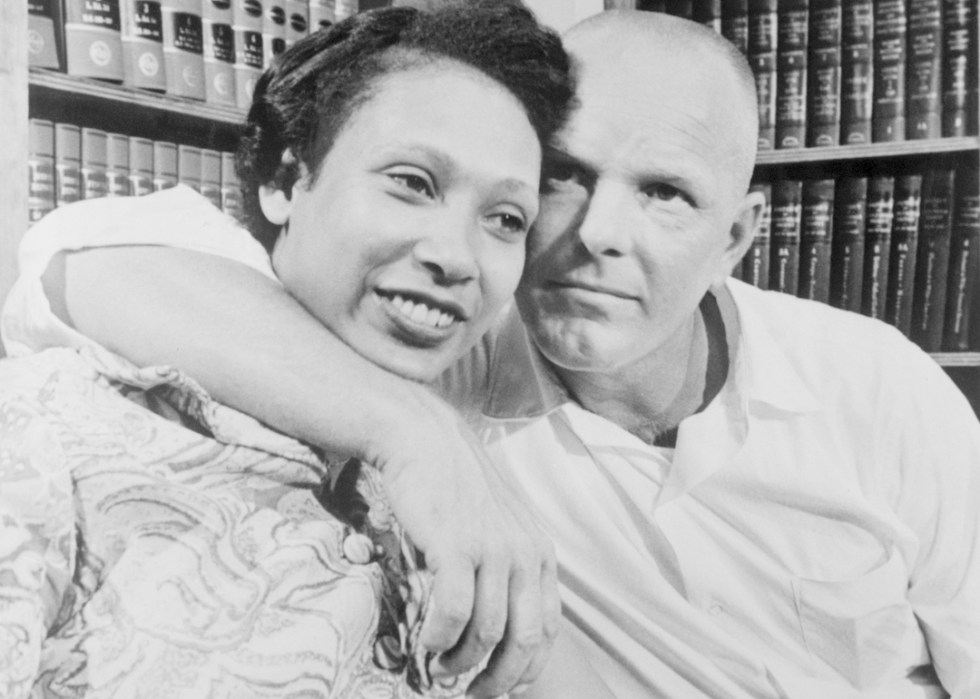
Bettmann // Getty Images
1967: Loving v. Virginia strikes down interracial marriage ban in Virginia
After being wed in Washington D.C., Richard and Mildred Loving were banned from Virginia as their marriage violated the state’s Racial Integrity Act. The two avoided jail time by moving to the nation’s capital. After five years of living in D.C., the interracial couple longed to return to their hometown. The American Civil Liberty Union got involved with the case, moving it all the way up to the Supreme Court.
1968: ‘Julia,’ starring Diahann Carroll, hits TV screens
In the groundbreaking sitcom, “Julia,” Diahann Carroll pioneers the role of Julia, a widow and nurse raising a son in the early 1970s. Carroll’s role in this series was notable in that it was one of the first television shows featuring a Black lead who wasn’t a domestic worker.
1969: UNC food workers go on strike
The dining hall workers of the University of North Carolina at Chapel Hill went on strike, citing poor working conditions and inadequate pay for their labor. The strike, led by Mary Smith and Elizabeth Brooks, began in February and lasted until December and serves as a representation of the effectiveness of peaceful protests against larger institutions.
1970: Gail Fisher wins a Primetime Emmy
Gail Fisher is the first African American woman to win a Primetime Emmy. The award was for her role in “Mannix,” a detective series starring Mike Connors on CBS. Later nominees to follow in her footsteps include Debbie Allen and Nell Carter.
1971: Congressional Black Caucus is formed
Made up of mostly African American members of Congress, the Congressional Black Caucus has for the last 50 years been committed to ensuring Black Americans and other marginalized members of society have equal rights and opportunities. The Caucus uses constitutional power, authority, and finances to address pressing issues like the reformation of the criminal justice system, voter suppression, and racial health disparities.
1972: Shirley Chisholm runs for president
Laying the groundwork for Barack Obama and Hillary Clinton to run for leader of the free world, Shirley Chisholm made history by being the first Black candidate of a major party in a presidential race. As a Barbadian American daughter of immigrants, Chisholm was a fiercely independent and strong thinker. Her campaign slogan, “Unbought and Unbossed,” suggested as much.
1973: Combahee River Collective is created
The Combahee River Collective, a political group of Black feminists and lesbians, developed in opposition to mainstream feminism that heavily favored the needs and issues of white women. The group was named after the Harriet Tubman uprising that freed more than 700 enslaved individuals. This brand of feminism championed the idea that Black women were inherently valuable and the best in terms of advocating their own liberation.
1974: Henry ‘Hank’ Aaron hits his 715th home run
Hank Aaron kicked things up a notch when he hit a home run in the fourth inning of a game against the Los Angeles Dodgers. With that one swing, Aaron surpassed Babe Ruth’s home run record, cementing his position as one of the best in baseball.
1975: John Hope Franklin is selected as president of the Organization of American Historians
Historian and educator John Hope Franklin was the first African American to preside in the role of president of the Organization of American Historians. He held many distinctions in life and was awarded the Presidential Medal of Freedom in 1995.
1976: Barbara Jordan delivers keynote address at Democratic National Convention
Barbara Jordan, a member of the U.S. House of Representatives, became the first Black woman to deliver a keynote speech at the Democratic National Convention. Jordan’s speech is regarded as one of the best of the 20th century and is still relevant today: “We are a people in a quandary about the present. We are a people in search of our future. We are people in search of a national community. We are a people trying not only to solve the problems of the present, unemployment, inflation, but we are attempting on a larger scale to fulfill the promise of America. We are attempting to fulfill our national purpose, to create and sustain a society in which all of us are equal.”
1977: Andrew Jackson Young Jr. becomes ambassador to the United Nations
A former senior aide to Martin Luther King Jr., Andrew Young’s commitment to the civil rights movement made him a perfect candidate for ambassador to the United Nations. Young became the first African American to take on this position and served as the official representative for the Carter administration’s foreign policy program.
1978: Muhammad Ali wins heavyweight boxing title for the third time
With his defeat of Leon Spinks, Muhammad Ali became the first boxer to win the world heavyweight boxing title three times in his career. He retired just three years later, returning only briefly for select fights. His accomplishments include 56 wins and 37 knockouts—as well as years working alongside fellow civil rights activists and celebrities in their own right such as Sam Cooke, Malcolm X, and NFL star Jim Brown.
1979: Assata Shakur goes on the run
The revolutionary icon and former member of the Black Liberation Army Assata Shakur escaped from prison in 1979 and went off the grid before being found alive in Cuba five years later. Her initial charges (all steeped in controversy) were attempted murder, murder, bank robbery, kidnapping, and armed robbery. She was convicted of the murder of a police officer because of a loophole in New Jersey law saying it did not need to be proven that Shakur had fired a mortal shot. She was sentenced to life before her escape. She remains in Cuba, although President Donald Trump in 2017 said the U.S. would consider lifting new, stricter rules against visitors to Cuba if fugitives such as Shakur were returned.
1980: Robert L. Johnson launches BET
After years of working behind the scenes in cable TV, Robert L. Johnson created Black Entertainment Television (BET), the first cable television station geared toward an African American audience. The channel was a hit, and Johnson became the first Black billionaire when he sold his company to Viacom in 2001. The BET division of Viacom today is the most widely received network for African American audiences, with the paid channel reaching over 88 million American households.
1981: Mumia Abu-Jamal is arrested
A routine traffic stop ended with the death of a police officer. Activist Mumia Abu-Jamal was arrested for the crime and put on trial for a murder he says he did not commit. This event catapulted Abu-Jamal to the forefront of a social justice movement against racial bias in the judicial system.
1982: Michael Jackson’s ‘Thriller’ is released
“Thriller,” the sixth studio album by Michael Jackson, went on to sell more than 33 million copies worldwide. “Thriller” is largely considered the best-selling record of all time. The following year Jackson released a 13-minute music video for the title song, changing the landscape of music videos forever.
1983: Vanessa Williams is crowned Miss America
Then 20-year-old Vanessa Williams made history by becoming the first Black Miss America. She would go on to reign for nearly 10 months before being forced to resign the title amid a nude photo scandal. Nevertheless, her star continued to rise as she made the transition to singer and actress.
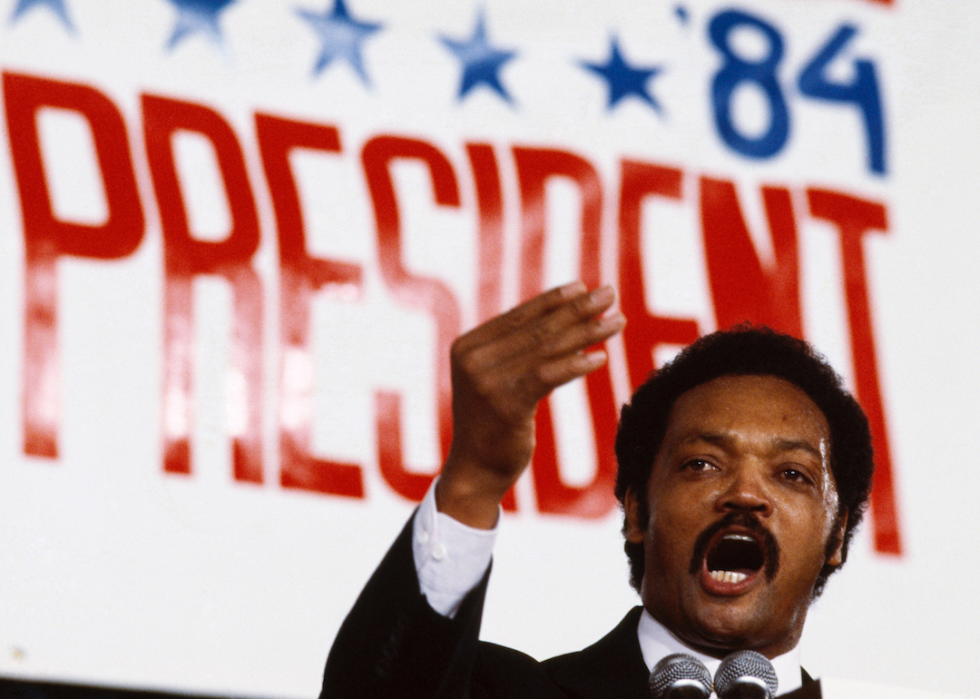
David Hume Kennerly // Getty Images
1984: Jesse Jackson runs for president
Civil rights activist and politician Jesse Jackson became the second African American to pursue a major campaign for president (after Shirley Chisholm), running as a Democrat. He ultimately took third place in the primaries and launched another unsuccessful bid in 1988. In spite of never securing the presidential nomination, Jackson laid the foundation for the election of America’s first Black president 24 years later.
1985: MOVE Black Liberation House is bombed
Philadelphia-based radical movement MOVE was headquartered in a house in West Philadelphia. On the morning of May 13, surrounding neighbors were evacuated by authorities before 500 police officers gathered around 6221 Osage to arrest collective members. MOVE members and the police exchanged fire, with the authorities bombing the compound and killing six adults and five children.
1986: Oprah Winfrey launches her talk show
“The Oprah Winfrey Show” catapulted news anchor Oprah Winfrey to stardom and went on to run for 25 years. The show was not only an influential platform for Winfrey, who had a rough childhood and worked her way up to co-anchoring the evening news and launching a production company but featured an array of topics and interests from thought-provoking guests. Winfrey’s work—as a talk show host, media empire, actress, author, and mentor—has left a permanent impression on young Black women and what goals they are willing to set for themselves.
1987: Dr. Ben Carson separates conjoined twins
Dr. Ben Carson was director of pediatric neurosurgery at Johns Hopkins Medicine when he became the first person in history to separate twins conjoined at the head. The risky surgery took 22 hours and was considered by many to be a medical miracle.
1988: The film ‘Mississippi Burning’ is released
“Mississippi Burning” is a crime drama is loosely based on the 1964 murders of James Chaney, Andrew Goodman, and Michael Schwerner. The three field workers organized voter registration for African Americans when they were reportedly abducted and murdered by the Ku Klux Klan. The film showcases the hostility and backlash the case received.
1989: Colin Powell becomes chairman of the Joint Chiefs of Staff
Nominated by President George H.W. Bush, Army Gen. Colin Powell became the first African American and the youngest person ever to become chairman of the Joint Chiefs of Staff. In this position, Powell helped pivot the U.S. military’s agenda away from the Soviet Union to focus on regional and humanitarian needs. Powell passed away from COVID-19 at age 84 in 2021.
1990: Lawrence Douglas Wilder becomes first elected African American governor
Nothing signals the changing times of the 1990s more than when Lawrence Douglas Wilder made history as the first elected African American governor. Twenty-eight years later, Stacey Abrams put up a good fight in her quest to become the first Black woman governor of Georgia.
1991: Julie Dash’s ‘Daughters of the Dust’ is released
A period piece set at the turn of the century, “Daughters of the Dust” tells the story of a group of Gullah women as they prepare to migrate north. Experimental in tone and imagery, Dash’s film is the first film directed by an African American woman to receive major distribution across the U.S. Years later, Beyoncé paid homage to the film in her “Lemonade” album.
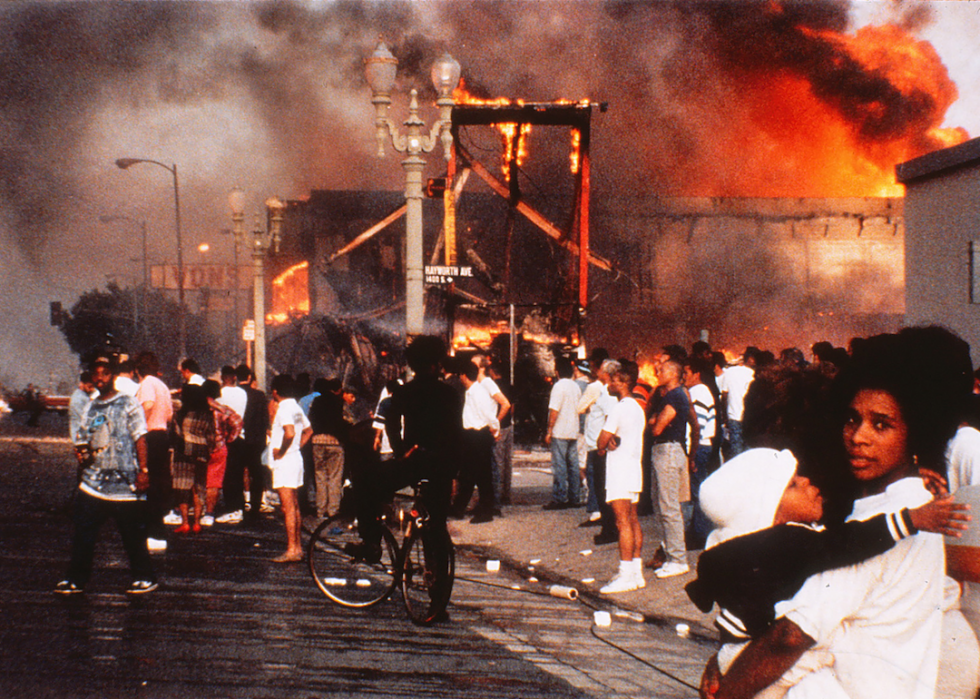
Lindsay Brice/Getty Images
1992: Rodney King beating ignites the LA Riots
Four Los Angeles police officers were acquitted in April of the beating of Rodney King. The vicious beating was caught on tape, however, and showed the extent of police brutality. The acquittal touched off the LA Riots and started an expanded, nationwide debate on racial injustice.
1993: Toni Morrison wins Nobel Prize for ‘Beloved’
Morrison won the Nobel Prize for Literature before the third novel of her trilogy “Beloved” was published. The first was released in 1987, and the story follows a formerly enslaved woman named Sethe and was later turned into a movie starring Oprah Winfrey.
1994: Nas’ debut album ‘Illmatic’ is released
The debut album of New York rapper Nas cemented his place among hip-hop and rap royalty. “Illmatic” actually didn’t sell well upon its release, but it gained rave reviews amongst music fans and critics. The album is regarded as one of the greatest rap albums of all time.
1995: Million Man March is held in Washington DC
Called on by Minister Louis Farrakhan, this mass meeting had the aim of changing the perception of Black manhood. The march has since gone down in history as a positive occasion of brotherhood and personal atonement, though some criticisms regarded the exclusion of women.
1996: ‘Moesha’ premieres
For young Black girls growing up in the 1990s, “Moesha” was the show to watch. Starring R&B and pop singer Brandy, the show portrayed an average Black high school teen growing up in Los Angeles. “Moesha” aired for six seasons and birthed a successful spin-off called “The Parkers.”
1997: Tiger Woods wins his first major
American golf got a much-needed shake-up when 21-year-old Tiger Woods won the prestigious Masters Tournament in Augusta, Georgia. Many regard Woods’ monumental win to be one of the greatest performances by a golf pro in history. Since then, he’s won 14 more majors, including four more Masters.
1998: ‘The Secret Diary of Desmond Pfeiffer’ is canceled after the first episode
“The Secret Diary of Desmond Pfeiffer” ignited controversy before it even aired for its lighthearted take on American slavery. Chi McBride starred as the title character, a butler to President Abraham Lincoln. Groups like the NAACP quickly got involved, calling for a boycott of the show and its parent company United Paramount Network. As a result, only one episode aired before its cancellation.
1999: Serena Williams wins US Open
One-half of the dynamic tennis-playing Williams sisters, Serena Williams became the first African American woman to win a grand slam in an Open Era tennis match. She would go on to win a record—male or female—22 more majors.
2000: Venus Williams wins Women’s Singles at Wimbledon
The legacy of Althea Gibson received some company when 20-year-old Venus Williams became the first African American woman to win Wimbledon since Gibson in 1958. Venus and Serena Williams became the first sisters in the history of tennis to win the Wimbledon doubles title.
2001: Rev. Wilton D. Gregory becomes president of United States Conference of Catholic Bishops
A man of God his whole life, the Rev. Wilton D. Gregory has held many positions in the church. None, however, were as important as the one he would take on in November 2001 when he became the president of the United States Conference of Catholic Bishops. He was the first African American to head an episcopal conference and was named Time’s Person of the Week in 2002 for his measured approach of defrocking priests embroiled in the sex abuse scandal of the Roman Catholic Church.
2002: Halle Berry wins Academy Award for ‘Monster’s Ball’
Halle Berry was the first African American to take home the Academy’s Best Actress Award for her portrayal of a grieving mother and widow in “Monster’s Ball.” Though the floodgates have opened for other women of color to be nominated in the same category, Berry holds the distinction of being the only Black woman to win.
2003: Dennis W. Archer becomes the president of the American Bar Association
Judge Dennis W. Archer made a name for himself in the world of law serving on the Michigan Supreme Court and also serving as mayor of Detroit for a time beginning in 1994. In 2003, his career was taken to another level when he was selected as the new president of the American Bar Association, the first African American to hold the position.
2004: Phylicia Rashad wins a Tony for Best Lead Actress in a play
Known for her role as Clair Huxtable on the 1980s sitcom “The Cosby Show,” actress Phylicia Rashad is no stranger to groundbreaking roles. She made history again playing the matriarch Lena Younger in “A Raisin in the Sun,” for which she earned the distinction of becoming the first African American woman to win the Tony Award for Best Actress in a Play.
2005: Condoleezza Rice becomes US secretary of state
Condoleeza Rice worked as a national security advisor before becoming the first Black female Secretary of State from 2005 to 2009. During her time in the position, Rice dedicated herself to transforming diplomacy in the Middle East.
2006: Soulja Boy starts global dance craze with ‘Crank That’
The 16-year-old rapper known as Soulja Boy first recorded his hit “Crank That” in 2006 in his home. A year later he became an overnight sensation after uploading the video to YouTube. The video was viewed tens of millions of times, making it one of the first viral music videos. The song and its catchy dance routine were a hit, with some calling the “Crank That” dance fad the biggest since 1996’s “The Macarena.” Later that year, the unsigned artist was nominated for a Grammy.
2007: Barbara Hillary goes to the North Pole
Barbara Hillary was 75 years old when she became the first Black woman to reach the North Pole. A few years later, at 79, Hillary trekked to the South Pole as well, becoming the first Black woman to hold that distinction as well.
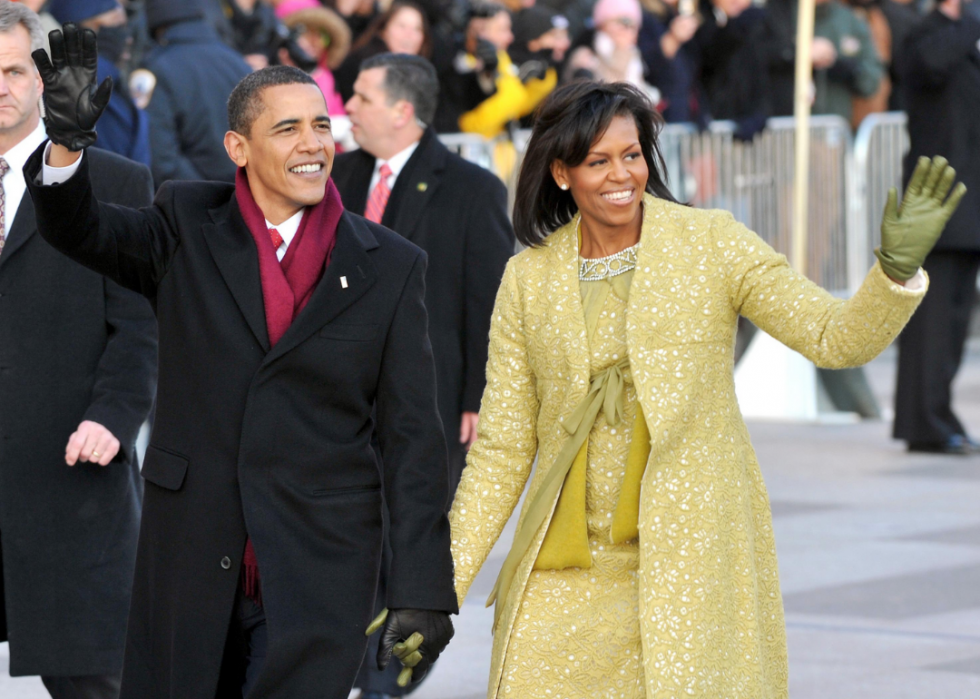
Ron Sachs-Pool // Getty Images
2008: Barack Obama becomes president of the United States
With the campaign slogan, “Yes we can,” Sen. Barack Obama became President Obama after defeating John McCain in the 2008 election. Many monumental changes were made during his two terms in office, including the Affordable Health Care Act and the election of Sonia Sotomayor, the first Latina and Hispanic justice on the Supreme Court.
2009: Disney’s first Black princess arrives
In a long-overdue move, Disney finally produced a film starring a Black princess to its catalog. “The Princess and the Frog” is set in 1920s New Orleans and follows a young woman called Tiana who dreams of opening her own restaurant. Her plans are dashed when she meets a two-faced prince who turns her into a frog. The film was a hit at the box office and was nominated for three Academy Awards.
2010: Dustin Byfuglien wins Stanley Cup with the Chicago Blackhawks
Fifty-two years after Willie O’Ree desegregated the hockey rink, Dustin Byfuglien had a memorable showing during the 2010 Stanley Cup. He tied for the team lead of the Chicago Blackhawks with 11 playoff goals, and his team eventually won the Stanley Cup over the Philadelphia Flyers.
2011: Charles E. Samuels Jr. becomes director of Federal Bureau of Prisons
Charles E. Samuels started with humble beginnings as a correctional officer in 1988. In 2011, he became the first African American man to oversee the Federal Bureau of Prisons. All his hard work paid off in 2015 when he was awarded the U.S. Department of Justice’s highest award, the Edward H. Levi Award for Outstanding Professionalism and Exemplary Integrity, which recognized his contributions to the law enforcement field.
2012: Fred Luter Jr. is elected the president of the Southern Baptist Convention
The Southern Baptist Convention, founded in 1845, is considered by many to be an institution born out of slavery. So when the Rev. Fred Luter Jr. was elected as the group’s first Black president, it was a signal to many that a change had arrived at the doorsteps of many Southern Baptists still holding outdated views.
2013: Cheryl Boone Isaacs is elected president of Academy of Motion Picture Arts and Sciences
PR and film-marketing exec Cheryl Boone Isaacs made a name for herself when she became the first Black president, and third female president, of the Academy of Motion Picture Arts and Sciences (AMPAS), the group responsible for the annual Academy Awards. Isaacs had her start as a Pan Am flight attendant but changed gears when she followed her late brother Ashley Boone Jr. (a motion-picture marketing and distribution executive) to Hollywood.
[Pictured: Academy President Cheryl Boone Isaacs on stage during the Academy of Motion Picture Arts and Sciences’ Governors Awards Nov. 16, 2013, in Hollywood, California.]
2014: Ava DuVernay earns a Golden Globe nomination
Ava DuVernay earned a Golden Globe nomination for her directorial work on the film “Selma.” She was the first Black woman director to be nominated for a Golden Globe. After the release of “A Wrinkle in Time” in 2018, DuVernay became the first Black woman to direct a $100 million-grossing film.
2015: Bree Newsome brings down the flag
Artist and activist Bree Newsome famously and boldly took down the Confederate flag in front of the South Carolina Capitol Building. Newsome’s act of defiance has gone down in history as one against hatred and oppression.
2016: Carla Hayden becomes Librarian of Congress
The first African American and first woman to lead the national library, Dr. Carla Hayden has been working in the information science field for decades. One of her biggest projects is collecting resources for the continued digitization of collections and materials.
[Pictured: Michelle Obama and Carla Hayden at American Library Association conference 2018 in New Orleans.]
2017: Tiffany Haddish hosts ‘Saturday Night Live’
The “Girls Trip” star made history when she hosted “Saturday Night Live,” becoming the first Black woman stand-up comic to do so in the show’s 43-season run. One year later, actor and musician Donald Glover served as host and musical guest.
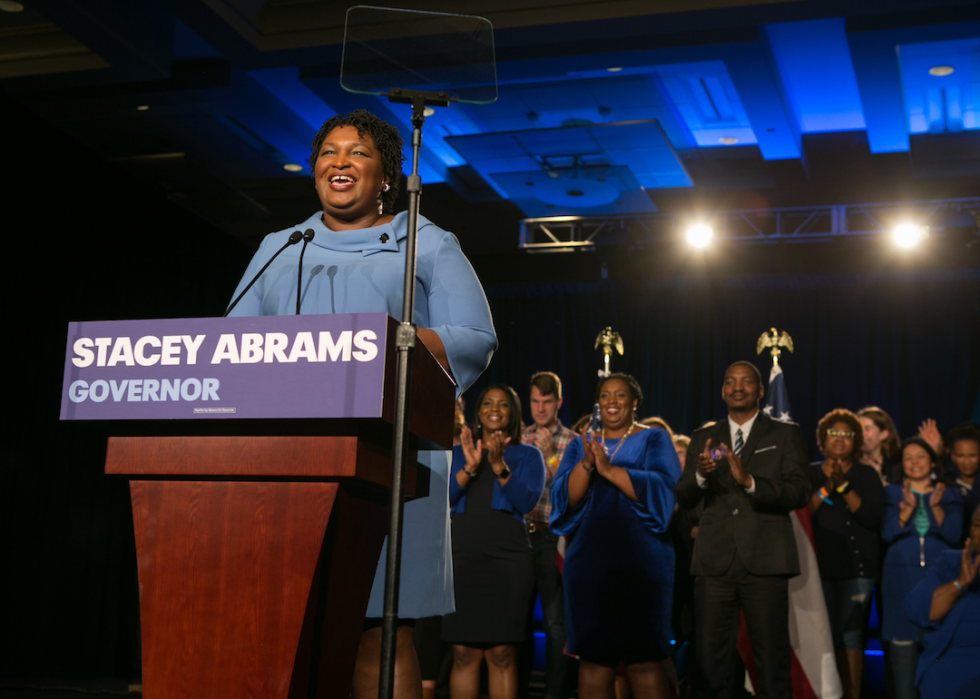
Jessica McGowan // Getty Images
2018: Stacey Abrams runs for governor of Georgia
The minority leader of the Georgia House of Representatives threw her hat in the ring in Fall 2018 with her bid for governor of Georgia. Despite losing by roughly 55,000 votes, Stacey Abrams’ campaign put a much-needed spotlight on voter suppression, which still runs rampant in American politics.
2019: ‘Black Panther’ achieves two milestones
Not only did the 2018 Marvel film “Black Panther” become the first superhero movie to star a predominantly Black cast, but at the 2019 Academy Awards, Ryan Coogler’s smash hit garnered two history-making Oscars. Ruth E. Carter became the first African American woman to win for Best Costume Design, thanking the Academy, in part, for “honoring African royalty, and the empowered way women can look and lead onscreen.” Hannah Beachler was the first to win for Best Production Design, remarking, “I stand here with agency and self-worth because of Ryan Coogler. … I stand here because of this man who offered me a better perspective of life.”
2020: Black Lives Matter/George Floyd Protests
Organizer Alicia Garza first used the phrase “Black lives matter” on Twitter in response to the acquittal of George Zimmerman, who shot and killed 17-year-old Trayvon Martin, in 2012. The term became the rallying cry of a movement that gained momentum in 2016 when San Francisco 49ers Colin Kaepernick, Eric Reid, and Eli Harold took a knee during the national anthem before a football game as a way to shine a light on police brutality against Black people. Following the police killing of George Floyd in May 2020, when officer Derek Chauvin knelt on the neck of 46-year-old Floyd for more than eight minutes, protests kicked off around the country and world to honor Floyd and all other Black lives.
2021: Kamala Harris sworn in as Vice President of the United States
On Jan. 20, 2021, American politician Kamala Harris made history threefold when she was sworn into office as President Joe Biden’s vice president of the United States. This cemented Harris’ mark in the history books by becoming not only the first female U.S. vice president but also the first of Black and Asian ancestry.
2022: Michaela Jaé Rodriguez wins Best Actress Golden Globe
Michaela Jaé Rodriguez, an actress of Black and Puerto Rican ancestry formerly known as Mj Rodriguez, is no stranger to making an impact with her powerful on-screen performance, particularly as Blanca Evangelista on FX’s period drama series, “Pose.” In 2021, Rodriguez became the first transgender woman to earn an Emmy Award nomination in a major category (Outstanding Lead Actress in a Drama Series). The following year, in 2022, Rodriguez carved another mark for herself in the history books when she won the Golden Globe Award for Best Actress at the 79th ceremony, making her the first transgender actor ever to win a category in the history of the awards.
